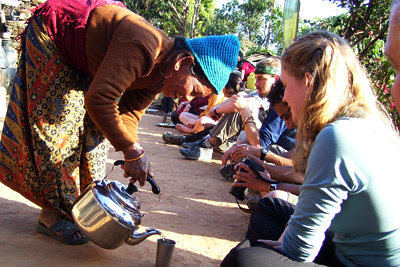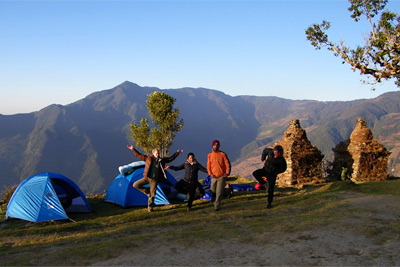Team hikes Nepali trails to help Cornell Outdoor Education go international
By Joseph Mansky


Spurning a day of rest in the midst of an 8,600-foot climb in Nepal over winter break, a Cornell team of students and faculty trekked another 5,000 feet to a nearby ridge and back in one day. Although they knew that many villagers in Nepal are subsistence farmers, the team saw beautiful trails that, with a little work, they envisioned as perfect for ecotourism.
Two faculty members, a Cornell Outdoor Education (COE) instructor and four students went to Nepal Dec. 27-Jan. 14 to look into a short-term cultural and environmental experience in Nepal for Cornell students, said professor of anthropology Kathryn March, and to help COE develop international options. A third goal was to help the village "develop the capacity to run a homestay-based cultural tourism program," March said.
The trip, sponsored by COE and the Cornell-Nepal Study Program (CNSP), the only program that Cornell Abroad exclusively administers), included a village homestay, several days of camping and exploring a nearby trail to see if it could be used by Cornell students or tourists in the future.
For students who don't have the chance to study abroad through CNSP for a full semester, the winter break trip would offer a shorter but culturally enriching experience, said Paul Josephson '10, a global health major with a minor in South Asian studies, who was on the trip and also participated in CNSP in 2008-09. CNSP and COE hope eventually to "offer an annual trip for Cornell staff and alumni, focused more on professional development and leadership and personal growth," added COE instructor Jim Volckhausen '88.
A substantial portion of the cost of the prospective trips would go "directly into community development," March noted. Funds from this trip, for example, will go toward developing a large water tank for the village of Mhanegang, where the team stayed.
March and Josephson are trying to organize community support for the tourism project and are working on a booklet and Web site for tourists on the "history, culture, religion, local crafts and trades of the area as well as social and cultural practices and expectations," Josephson said.
In Mhanegang, the students lived with host families. "The critical goal behind all of the programs in Nepal has been to make sure the students don't have a bubble experience," said March, who founded CNSP in 1993.
During the homestay,Kate Walker '10, for example, an animal science major and COE climbing instructor, was amazed by how differently the Nepali villagers live, mentioning that her host mother cooked large meals on a tiny corner stove made of mud and that "there's only one public tap where you go to bathe."
Each morning the students did "whatever their family was doing," March said, whether that was milking water buffalo, cutting fodder, carrying firewood or fetching water. They spent the middle part of the day learning such craft skills as how to weave mats, husk rice or make rope. They also did some community service, helping build trails or volunteering at local schools.
Volckhausen said the homestay experience was a "cultural immersion," in that the students shared in many local rituals, from Buddhist and shamanic ceremonies to "a very moving funeral ceremony for a village leader."
Three Nepali students from Tribhuvan National University of Nepal accompanied the Cornellians on the trek, offering everyone some "bidirectional cultural learning," said Devin Cowan '10, a biological and environmental engineering major and COE tree climbing instructor.
Joseph Mansky '12 is a writer intern for the Cornell Chronicle.
Media Contact
Get Cornell news delivered right to your inbox.
Subscribe